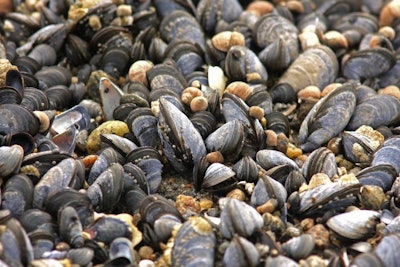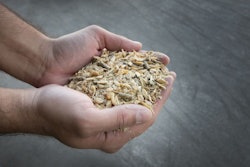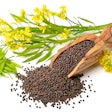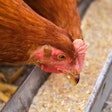
In effort to replace fish meal, mussels have been overlooked, researchers say
While the popularity of alternative proteins is rising rapidly, a team of researchers in Australia believes they’ve found a potential way to replace fish meal that you haven’t heard of: mussels.
Preliminary trials conducted in Thailand indicated that prawns and barramundi preferred the mussels over conventional fish meal, possibly because the dried mussel meal contains betaine, a naturally occurring appetite stimulant, according to Karlie Wilson, co-founder and technical director at Australian aquaculture firm Green Blue Health. The sustainability-focused aquaculture company plans to trial multiple diets including dried mussel meal with support from Australia’s Commonwealth Scientific and Industrial Research Organization (CSIRO).
“We see the mussel and krill meal as strategic ingredients to add to diets,” said Ha Truong, a research scientist in the aquaculture nutrition program at CSIRO. These ingredients are desirable not only for their ability to increase the palatability of low-fish meal but also contain valuable proteins and other nutrients, she said.
The research team plans to use mussel meal that is leftover from mussels used to create supplements for human health, Wilson said, estimating that this oil extract process produces about 500 tons per year of a high-protein mussel meal. Although the extraction process removes a large portion of the EPA/DHA typically associated with fish oil, some essential fatty acids are still present in the mussel meal, she said, and the fact that the meal is not heat-treated should render the proteins in the meal more digestible.
Because of the limited supply, Truong said, the mussel meal won’t necessarily compete with fish meal from a cost perspective, but could prove valuable in feed for prawns and other species that have proven more likely to reject other fish meal alternatives.
“We’ve been working with this particular product for over 20 years, and it’s widely used in pet food, so now we’re looking at how we can utilize it in Australia,” Wilson said. “We’re really growing in the prawn spawning space, and that’s where we want to grow it.”
Mussel meal could also help the aquaculture industry reduce its overall dependence on fish meal, Truong said. Mussels were identified this year in a study out of Indonesia as one of several promising marine ingredients that are underutilized in aquafeed.
The study, which will take place at CSIRO’s Bribie Island Research Center in Queensland, Australia, will measure the growth performance of prawns fed a variety of diets containing a mix of fish meal, mussel meal, and plant- and algae-based alternatives. The results are due out in 2022.















